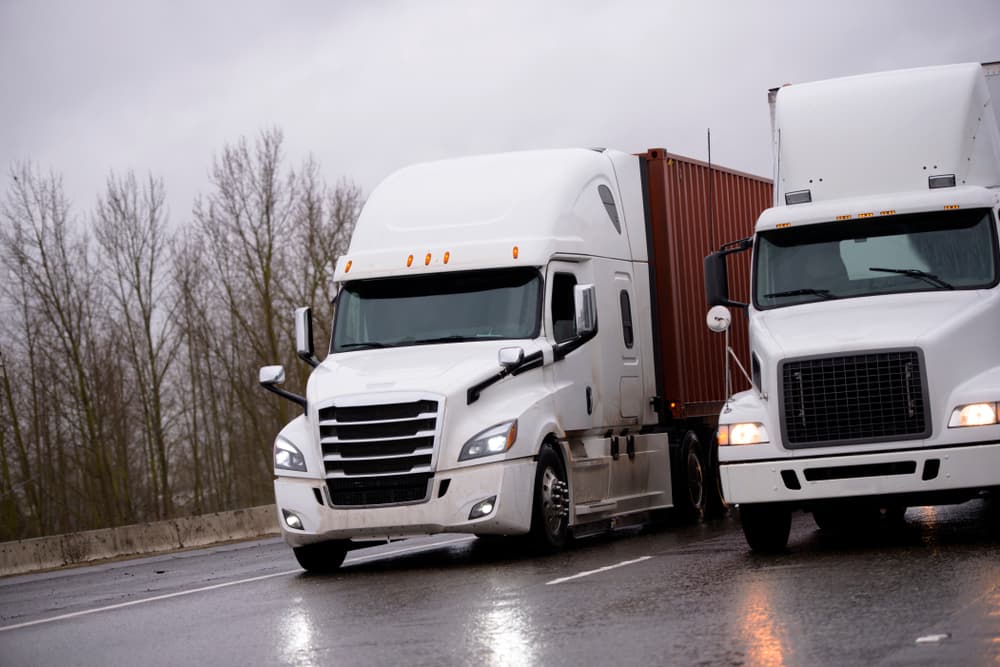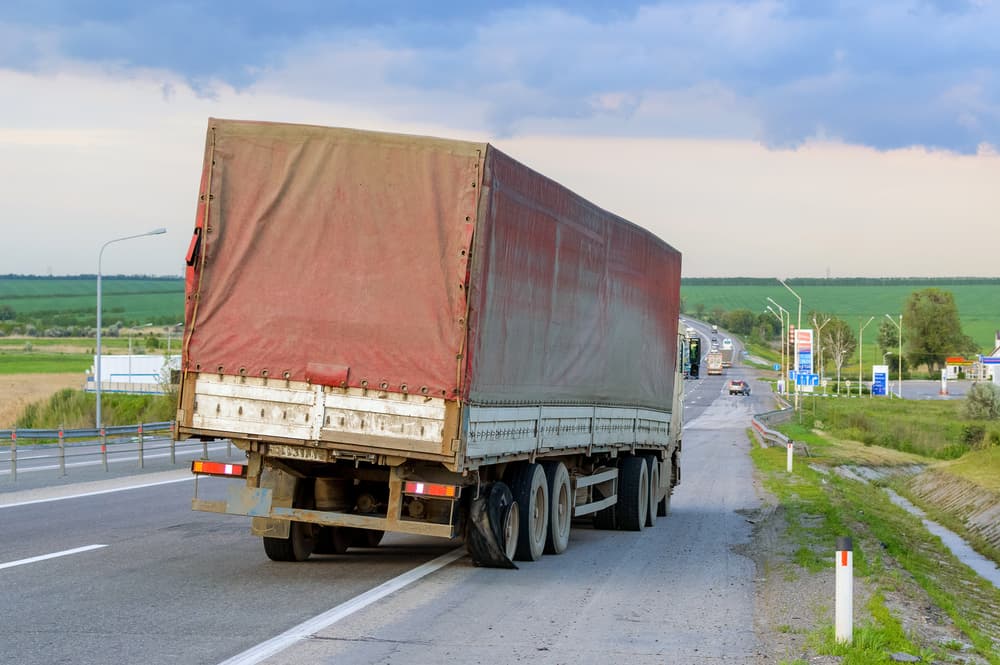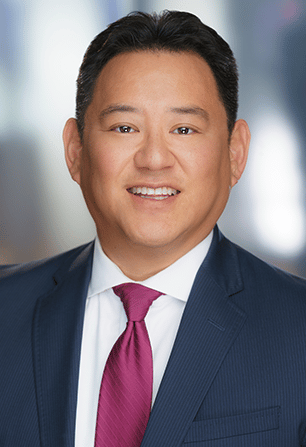Big rig accidents are often catastrophic and deadly, injuring more than 145,000 people and killing about 5,000 people annually.
Understanding the most common types of truck accidents matters. Knowing how they occur, the injuries they cause, and how an attorney can help protect your personal and financial health.
If a big rig crash injured you, our experienced, powerhouse truck accident lawyers fight for you and your family to get your rightful justice and compensation.
Big rigs are essential to keeping the country running. Few supplies would make it to the market without this mode of transportation. Despite their usefulness, large commercial semis pose an enormous risk on the road since their size leads to catastrophic truck accidents.
What Statistics Say About Truck Accident Types

National truck accident statistics reveal around 500,000 truck crashes annually, resulting in thousands of fatalities and injuries to motorists and other roadway users.
Most of these incidents involve driver fatigue, distracted driving, improper cargo loading, and hazardous road conditions. Some truck drivers operate overloaded or poorly maintained vehicles as well.
Driving above the speed limit, making improper lane changes, not using turn signals, and making other poor driving decisions are responsible for around 50 percent of truck accidents.
Other factors may include weather conditions, road defects, excessive cargo weight, or shift lengths exceeding legal limits.
The Most Common Types of Accidents Involving Trucks
There are more types of truck accidents than you’d imagine, and each one causes different sorts of problems.
Carriage Underride Accidents
Carriage underride accidents are hazardous and can be catastrophic. They happen when the front end of a car meets the back of a larger vehicle, such as an 18-wheeler truck or tractor-trailer.
The smaller vehicle may slide underneath the larger one and become wedged. Carriage underride accidents can cause severe injuries and fatalities, as the car’s occupants are often crushed or severely injured.
Due to limited visibility from the cab, truck drivers may not be aware of an underride accident until after it happens.
Head-On Accidents
Head-on collisions are among the most serious types of car accidents. They happen when a vehicle crashes into another while traveling in the opposite direction. These accidents often result in severe injuries, permanent disability, and even death.
Common causes of head-on collisions include distracted or drowsy driving, impairment, and excessive speed.
The aftermath of a head-on collision and the medical bills and other expenses associated with these types of accidents are overwhelming, often including traumatic brain and spinal cord injuries, blunt force trauma to the chest and abdomen, and multiple types of fractures.
An experienced personal injury lawyer helps navigate the legal process and protects the victim’s rights.
Truck Jackknife Accidents
Truck jackknife accidents occur when a tractor-trailer skids or slides sideways, forming a 90-degree angle similar to the blade of the knife. These collisions are dangerous and can cause severe injury or death.
Jackknifing is caused by several factors, including excessive speed, improper loading, tire or mechanical failure, or driving too fast for road conditions.
The rapid and unexpected nature of these accidents makes them particularly dangerous. Due to their potential destructive force, they are one of the most hazardous driving situations.
Jackknife accidents often result in severe damage to vehicles, cargo, and property. The impact is devastating if a truck jackknifes into other cars or objects.
Occupants of the other vehicle involved in the crash may suffer injuries such as femur fracture or even death. Pedestrians and cyclists are also vulnerable to blunt force trauma by a jackknifed truck.
The best way to prevent jackknife accidents is for truckers to take the necessary precautions when driving in hazardous conditions: limit their speed, maintain a safe distance between vehicles, and avoid sudden turns or stops.
Truckers must ensure their trucks are properly maintained, and their cargo is loaded and secured correctly. Poorly loaded cargo can initiate a jackknife accident.
Truck Rear-End Accidents
Truck rear-end accidents can be severe because of a large commercial truck’s size, weight, and speed. These types of collisions often result in injuries to the head, neck, and upper back or even death.
Unfortunately, some truckers are negligent or distracted while on the job and fail to stop their vehicles in time. An overloaded truck takes longer to stop, increasing the likelihood of a rear-end collision.
Contacting a lawyer as soon as possible after an accident is essential so your case can be evaluated appropriately and your rights protected. An attorney can help you get the compensation you deserve for your losses and injuries.
Truck Rollover Accidents
Truck rollover accidents are some of the most dangerous accidents on roadways. They cause serious injuries or death to both drivers and passengers, as well as damage to property and the environment.
Truck rollovers occur when a commercial vehicle loses its stability while in motion due to excessive speed, uneven load distribution, poor road conditions, or driver error.
It can cause severe injuries such as head trauma, spinal cord injury, broken bones, and even death. It can also damage property and the environment due to hazardous materials (such as oil or gasoline) inside the truck spilling onto the roadway.
T-Bone Accidents with Trucks
T-Bone accidents involving trucks are hazardous. In a T-Bone accident, one vehicle collides at an angle with the side of another. The size and weight difference between a truck and a car make these accidents particularly hazardous.
The impact force in a T-bone crash can be much higher if two vehicles of different sizes collide. The sheer mass of the trucks can cause catastrophic damage and severe injury or death to passengers in the smaller vehicles.
Truck drivers might be unable to stop quickly enough when presented with an unexpected hazard, such as another vehicle crossing into their lane, resulting in a devastating T-bone accident.
Due to trucks’ size and weight, even low-speed collisions can be dangerous for other drivers.
Common causes of T-bone accidents involving trucks include distracted driving, brake failure, crossing into another lane without warning or paying attention, failure to yield the right of way, and speeding in an intersection.
Sideswipe Accidents With a Truck
Sideswipe accidents with trucks, often caused by a truck driver’s failure to check blind spots before lane changes, are hazardous. They occur when a truck’s side contacts another vehicle’s side, leading to severe outcomes due to the size and weight disparity between trucks and passenger vehicles.
Causes include trucks drifting from their lanes due to fatigue, distraction, or improper maneuvering in traffic or on highways. The impact can force smaller vehicles off the road, cause loss of control, or result in multi-vehicle pile-ups.
Victims face injuries, property damage, and emotional trauma. Determining liability in these accidents requires investigation into truck driver negligence, such as failing to signal or check blind spots.
Victims need legal representation to navigate trucking regulations and insurance claims, ensuring the protection of their rights and securing deserved compensation.
Wide Turn Accidents Involving a Truck

Wide turn accidents with trucks often occur when a big rig turns too broadly, colliding with another vehicle or object. These accidents can also result from a truck driver’s lack of awareness, leading to preventable collisions.
Trucks, due to their size, need extra space to maneuver, highlighting the importance of giving them room on the road. Such accidents frequently stem from a driver’s inexperience or misunderstanding of navigating wide turns.
Truck drivers might not correctly judge an intersection or road’s size and layout before turning, leading to mishaps when they don’t consider challenges like limited space or tight corners.
Speed is also crucial; many states set specific limits for trucks making wide turns to ensure safety.
Truck Accident FAQ
A: The majority of truck accidents are due to driver fatigue, distracted driving, improper cargo loading, and hazardous road conditions. Other factors include speeding, inadequate lane changes, and mechanical failures.
A: These occur when a smaller vehicle slides underneath a larger truck or trailer, often resulting in severe injuries or fatalities due to the crushing impact.
A: Extremely serious. Head-on collisions often result in severe injuries, permanent disability, or death, due to the high impact force when a vehicle crashes into the front of a truck.
A: A jackknife accident happens when a truck folds at the articulation point, resembling a folding knife. This is dangerous because it can lead to severe damage and injuries due to the truck sliding uncontrollably.
A: They typically occur when a truck fails to stop in time, often due to distraction, negligence, or an overloaded truck which takes longer to stop, leading to collisions with vehicles ahead.
A: Truck rollovers can cause serious injuries or fatalities, and the spilled cargo can pose additional dangers to other road users and the environment.
A: The size and weight of trucks mean that when they collide with the side of another vehicle, the impact can cause catastrophic damage and severe injuries.
A: Sideswipe accidents usually happen when a truck drifts out of its lane due to driver fatigue, distraction, or failure to check blind spots, leading to collisions with vehicles alongside.
A: Trucks making wide turns require additional space and often misjudge the size of the turn or the road, leading to collisions with vehicles or objects in their path.
A: Wilshire Law Firm specializes in truck accident claims, offering personalized service to secure maximum compensation for victims. They have extensive experience in dealing with insurance companies and understanding relevant laws and regulations, ensuring the best outcome for their clients.
Our Truck Accident Lawyers Can Help
The dedicated legal team of personal injury attorneys at Wilshire Law Firm will fight to ensure you receive the compensation you deserve. We have successfully recovered over $1 billion and verdicts on behalf of our clients, and we are committed to getting the results you need.
When you turn to Wilshire Law Firm’s truck accident attorneys, you can trust that we have your best interests in mind. Win with Wilshire!
Call us 24/7 at (213) 335-2402 to get started or reach out online. We are here to help.
Our award-winning truck accident law firm understands the unique complexities of filing a truck accident claim. We provide personalized service to all our clients, and we will work tirelessly on your behalf to ensure you receive the maximum compensation for your injuries.
We have extensive experience dealing with insurance companies and coverages related to truck accidents.
Our knowledge of state and federal laws and regulations helps us effectively intervene in truck accident claims on your behalf.
You can get to know us during a free case review. Our truck accident lawyers will review your case and answer your questions. We explain your legal options and help you make the best decisions for your future.











